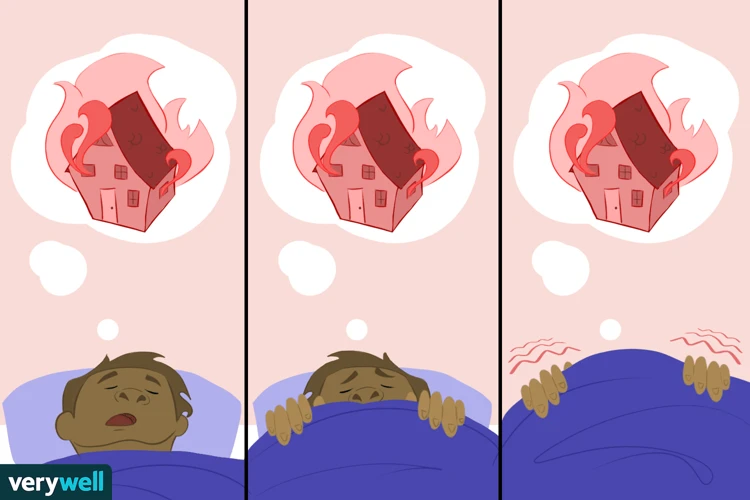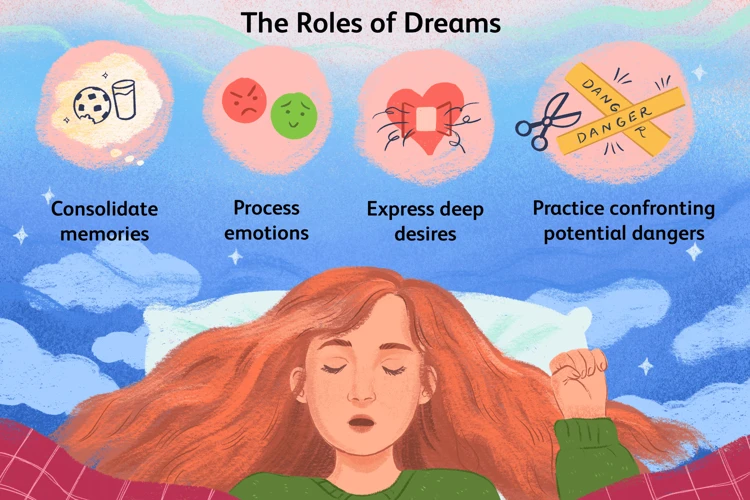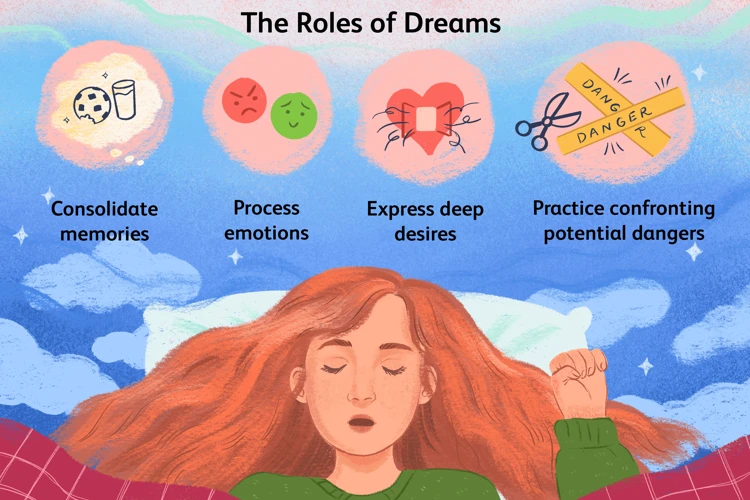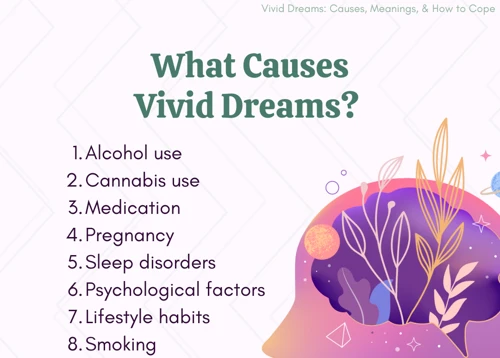Have you ever woken up in the middle of the night, drenched in sweat, your heart pounding, and your mind racing from a vivid and terrifying dream? Nightmares can be a perplexing experience, leaving us feeling overwhelmed and unsettled. But what exactly are nightmares, and why do we have them? In this article, we will delve into the twisted realm of nightmares and explore their causes and interpretations. From anxiety and stress to symbolic meanings, we will unravel the mysteries behind these haunting dreams. So, strap in and prepare to journey into the depths of the subconscious mind, as we unlock the secrets of nightmares and discover how to cope with them.
What are Nightmares?

Nightmares are vivid and distressing dreams that occur during the rapid eye movement (REM) stage of sleep. During this stage, our brains are highly active, and we experience a range of intense emotions and visual imagery. Unlike regular dreams that may be bizarre or fantastical, nightmares typically involve feelings of fear, terror, or anxiety. They often leave a lasting impression upon awakening, causing a surge of adrenaline and a heightened sense of unease. Nightmares can vary greatly in content and intensity, ranging from being chased or attacked to experiencing the loss of teeth or failing an exam. These dreams can be so realistic and disturbing that they can disrupt our sleep patterns and leave us feeling unsettled long after waking up. Understanding nightmares is essential for gaining insight into our subconscious fears, anxieties, and unresolved issues, allowing us to address and overcome them. To delve further into the world of dreams and their interpretations, you may want to explore the influence of culture on dream interpretation (source) or the various types of dream interpretations (source). Additionally, understanding the connection between dreams and emotions (source) can provide valuable insights into the complex nature of nightmares. Let’s now explore the common causes of nightmares and how they can be interpreted to uncover deeper meanings.
Common Causes of Nightmares

Nightmares can have various underlying causes that contribute to their occurrence. These terrifying dreams are often linked to heightened levels of anxiety and stress, which can disrupt the normal sleep cycle and lead to vivid and unsettling imagery. Traumatic experiences, such as accidents or witnessing violence, can also trigger nightmares as the subconscious mind attempts to process and make sense of these distressing events. Certain medications and substance abuse, such as antidepressants or withdrawal from drugs, can disrupt brain chemistry and lead to nightmares. Additionally, individuals with sleep disorders, such as sleep apnea or insomnia, may be more prone to experiencing nightmares due to the disruption of sleep patterns. By identifying the root causes of nightmares, individuals can address these issues and seek appropriate interventions to alleviate their frequency and intensity.
1. Anxiety and Stress
1. Anxiety and Stress:
– Anxiety and stress are among the most common causes of nightmares. When we experience high levels of anxiety or undergo significant stress, our minds can become overwhelmed, leading to an increase in vivid and disturbing dreams.
– Anxiety-related nightmares often involve themes of being trapped, pursued, or experiencing impending doom. These dreams may reflect our subconscious fears and worries, manifesting in terrifying scenarios during sleep.
– Stress-related nightmares can be triggered by various factors, such as work pressure, relationship issues, financial concerns, or major life changes. These dreams may symbolize the feeling of being overwhelmed or lacking control in waking life.
– The emotional intensity of anxiety and stress can also disrupt our sleep cycles, causing fragmented sleep and an increased likelihood of experiencing nightmares.
– To alleviate anxiety and stress-related nightmares, it’s important to address the root causes of these emotions. Practicing stress management techniques, such as deep breathing exercises, meditation, or engaging in relaxation activities (source), can be beneficial.
– Seeking support from a therapist or counselor can also provide valuable tools and strategies for managing anxiety and stress, ultimately reducing the frequency and intensity of nightmares associated with these issues.
2. Traumatic Experiences
Traumatic experiences can have a profound impact on our mental well-being, and they often manifest in our dreams as nightmares. These experiences can range from witnessing or experiencing a physical assault, surviving a natural disaster, being involved in a car accident, or enduring any other form of trauma. The vivid and distressing images associated with these events can haunt our subconscious and replay in our dreams, allowing us to process and make sense of the trauma. In some cases, nightmares related to these experiences can be retraumatizing, causing a heightened emotional response and a sense of helplessness. It is important to acknowledge and seek support for the trauma we have faced, as unresolved trauma can contribute to the frequency and intensity of nightmares. Professional help, such as therapy or counseling, can play a crucial role in addressing and healing from traumatic experiences. Additionally, practicing self-care, engaging in relaxation techniques, and finding healthy coping mechanisms can help mitigate the impact of traumatic experiences on our dream life.
3. Medications and Substance Abuse
Medications and substance abuse can play a significant role in the occurrence of nightmares. Certain medications, such as antidepressants, antipsychotics, and blood pressure medications, have been known to cause vivid and disturbing dreams as a side effect. These medications can alter brain chemistry and affect the sleep-wake cycle, leading to an increase in dream intensity and the likelihood of experiencing nightmares. Additionally, substance abuse, particularly with drugs like alcohol, marijuana, and hallucinogens, can disrupt normal sleep patterns and contribute to the occurrence of nightmares. The psychoactive effects of these substances can alter brain function and lead to the manifestation of chaotic and distressing dream content. It is important to note that the relationship between medications, substance abuse, and nightmares is complex and can vary from individual to individual. However, if you are experiencing frequent nightmares and are taking medications or using substances, it may be beneficial to consult with a healthcare professional to explore alternative treatment options or address any underlying issues. By understanding the potential impact of medications and substance abuse on nightmares, we can take steps towards managing and minimizing their occurrence.
4. Sleep Disorders
Sleep disorders can play a significant role in the occurrence of nightmares. Conditions such as sleep apnea, insomnia, and restless leg syndrome can disrupt the normal sleep cycle, making individuals more prone to experiencing nightmares. Sleep apnea, characterized by pauses in breathing during sleep, can lead to oxygen deprivation and fragmented sleep, triggering vivid and intense dreams. Insomnia, a sleep disorder characterized by difficulty falling asleep or staying asleep, can also contribute to nightmares due to the disruption in the sleep-wake cycle. Restless leg syndrome, a neurological disorder that causes an irresistible urge to move the legs, can lead to frequent awakenings during the night, increasing the chances of experiencing nightmares. Additionally, other sleep disorders such as narcolepsy and sleepwalking have also been associated with nightmares. It is important to address and treat any underlying sleep disorders to improve sleep quality and reduce the frequency and intensity of nightmares. Seeking medical advice and following proper sleep hygiene practices can help in managing sleep disorders and minimizing the impact of nightmares on overall well-being.
Symbolic Interpretations of Nightmares

Symbolic interpretations of nightmares delve into the hidden meanings behind the imagery and events experienced in these unsettling dreams. Exploring the symbolic elements of nightmares can provide valuable insights into our subconscious fears and anxieties. Here are a few common nightmares and their possible symbolic interpretations:
- Falling: Dreaming of falling may signify a loss of control, a fear of failure, or a lack of stability in one’s life.
- Being Chased: Being chased in a nightmare often represents running away from a problem or feeling pursued by unresolved emotions or fears.
- Losing Teeth: Losing teeth in a dream can symbolize feelings of powerlessness, vulnerability, or a fear of aging or losing one’s attractiveness.
- Being Attacked: Dreams of being attacked may reflect feelings of vulnerability, conflict, or a sense of being overwhelmed in waking life.
- Failing an Exam: Dreaming of failing an exam can represent feelings of inadequacy, self-doubt, or a fear of not living up to expectations.
While these interpretations can provide a starting point for understanding the symbolic meanings of nightmares, it’s important to remember that the interpretation of dreams is highly subjective and can vary from person to person. Exploring the symbolism in nightmares can help us gain deeper insights into our subconscious mind and guide us towards personal growth and self-discovery.
1. Falling
Falling is a common theme in nightmares, and it often induces a sense of fear and vulnerability. In these dreams, individuals may find themselves plummeting from great heights without any control or ability to stop. The experience of falling in a dream can be incredibly vivid, accompanied by physical sensations such as a racing heart or a sinking feeling in the stomach. Psychologists interpret the symbolism of falling in dreams in various ways. Some believe that it represents a lack of stability or insecurity in waking life. It could reflect a fear of failure or a sense of losing control. Falling dreams might also indicate a personal setback or a sense of being overwhelmed by life’s challenges. Alternatively, some interpretations suggest that falling represents a need for change or a desire to let go of something that no longer serves us. By paying attention to the emotions and circumstances surrounding the falling dream, individuals can gain insight into the areas of their life that may require attention or adjustment. It is important to note, however, that dream symbolism is highly personal, and the interpretation may vary depending on an individual’s unique experiences and emotions.
2. Being Chased
Being chased is a common theme in nightmares that evokes feelings of fear, vulnerability, and a sense of impending danger. In these dreams, the dreamer is often pursued relentlessly by a person, an animal, or an unknown entity. The act of being chased symbolizes a sense of threat or pressure in one’s waking life that the individual feels unable to escape from. When we are chased in a dream, our fight-or-flight response is triggered, causing increased heart rate, shallow breathing, and heightened anxiety.
Dream analysts interpret being chased as a representation of avoidance or running away from a problem or issue that we may be facing in our waking life. It may reflect our attempts to evade responsibilities, confrontations, or difficult emotions. Being chased can also signify feelings of being overwhelmed by stress, obligations, or past traumas.
To gain a deeper understanding of the specific meaning behind being chased in a dream, it is crucial to consider the context and the emotions involved. For example, if the pursuer is familiar, such as a friend or family member, it may suggest unresolved conflicts or strained relationships. On the other hand, being chased by a monster or supernatural creature may symbolize fears and anxieties that feel larger than life.
It is important to note that the interpretation of being chased can vary from person to person, as dreams are highly personalized and influenced by individual experiences. To explore other symbolic interpretations and gain further insight into the meaning of your specific dream, consulting with a dream analyst or psychologist may be beneficial.
3. Losing Teeth
Losing teeth is a common theme in nightmares and can evoke feelings of vulnerability, loss, and powerlessness. This unsettling dream symbol can have different interpretations depending on the individual’s personal experiences and cultural beliefs. Here are a few possible explanations for the symbolic meaning of losing teeth in nightmares:
1. Fear of Aging or Mortality: Losing teeth can be associated with the natural process of aging and the fear of mortality. It may reflect worries about growing older, losing vitality, or facing one’s own mortality. This interpretation often arises in individuals who are experiencing significant life changes or grappling with existential concerns.
2. Communication and Expression Issues: Teeth play a vital role in communication and self-expression. Losing teeth in a dream may symbolize difficulties in expressing oneself effectively or feeling unheard. It could represent a fear of being misunderstood or being unable to convey one’s thoughts, opinions, or needs adequately.
3. Personal Transformation: Similar to the way children lose their baby teeth to make way for permanent teeth, losing teeth in dreams can signify personal transformation or growth. It may symbolize shedding old habits, beliefs, or situations to make room for new beginnings and personal development.
4. Loss of Control or Powerlessness: Losing teeth can represent a loss of control or a sense of powerlessness in waking life. It may reflect feelings of helplessness in certain situations, such as being unable to protect oneself or feeling dominated by others. This interpretation is particularly common in individuals experiencing stress, challenges, or conflicts.
5. Insecurity and Self-Esteem: Teeth are often associated with beauty and attractiveness. Dreaming of losing teeth could be linked to concerns about one’s physical appearance or self-esteem. It may reflect insecurities about one’s attractiveness, perceived flaws, or fear of rejection by others.
It’s important to note that dream interpretation is subjective, and these explanations are not definitive. The specific details and emotions surrounding the dream should also be taken into account when interpreting the meaning of losing teeth. It can be helpful to keep a dream journal, note recurring themes, and reflect on personal experiences and emotions to gain a deeper understanding of the significance of losing teeth in your nightmares.
4. Being Attacked
Being attacked is a chilling theme that often appears in nightmares. These dreams can be incredibly intense, leaving us feeling vulnerable and frightened. The experience of being attacked in a nightmare can take various forms, such as being pursued by a threatening figure, being physically assaulted, or witnessing a violent act. The symbolism of being attacked in dreams can represent feelings of powerlessness, vulnerability, or a sense of being overwhelmed by external forces. It may reflect unresolved conflicts or a fear of being hurt, either physically or emotionally. These dreams can also be indicative of suppressed anger or aggression within ourselves that we have not addressed in our waking lives.
To better understand the significance of being attacked in nightmares, it is helpful to keep a dream journal and reflect on any recurring patterns or triggers. By identifying the specific details and emotions associated with these dreams, we can begin to unravel their deeper meanings. Some possible interpretations of being attacked in nightmares include:
1. Symbolic representation of inner struggles: The attackers in our dreams may symbolize our own internal battles, indicating a need to confront suppressed emotions, fears, or unresolved conflicts.
2. Feelings of vulnerability and insecurity: Dreaming of being attacked can be a manifestation of our insecurities and fears of being harmed or taken advantage of in our waking lives.
3. Fear of losing control or personal boundaries: The act of being attacked may reflect a fear of losing control, whether it be in relationships, work, or personal endeavors. It could also signify a violation of personal boundaries.
4. External stressors and anxieties: Nightmares of being attacked can often be linked to external stressors, such as ongoing conflicts, traumatic events, or a general sense of unease in our daily lives.
It is important to remember that the interpretation of dreams is highly subjective, and the specific meaning of being attacked in nightmares can vary for each individual. Exploring the emotions and context surrounding the dream can provide valuable insights into our subconscious fears and help us address them in our waking lives.
5. Failing an Exam
Failing an exam is a common theme in nightmares and can evoke feelings of stress, anxiety, and self-doubt. This type of dream often stems from the fear of failure or the pressure to perform well academically. It may reflect feelings of inadequacy, fear of disappointing others, or concern about not meeting expectations. Dreaming about failing an exam can also indicate a lack of preparedness or feeling overwhelmed by a particular challenge in waking life. Interestingly, this type of nightmare can occur even if you are no longer a student. It symbolizes a broader fear of being judged, evaluated, or not measuring up in some aspect of your personal or professional life. The dream may serve as a subconscious reminder to address these insecurities and take proactive steps towards building confidence and resilience. Understanding the root cause and interpretation of this nightmare can help you identify areas where you feel vulnerable and work towards overcoming these feelings of self-doubt.
Psychological Analysis of Nightmares

Nightmares are not merely random occurrences, but often carry significant psychological meaning. Psychological analysis of nightmares can provide valuable insights into our inner fears, anxieties, and unresolved emotions. One possible explanation for recurring nightmares is unresolved fear or trauma. These dreams may serve as a subconscious attempt to process and confront the unresolved experiences that continue to haunt us. Repressed emotions may also find expression in nightmares, as our subconscious mind seeks to bring these suppressed feelings to our conscious awareness. Insecurity and self-doubt can manifest in nightmares as well, reflecting our internal struggles and uncertainties. By delving into the psychological analysis of nightmares, we can gain a deeper understanding of ourselves and use this knowledge to address and heal the underlying issues that contribute to these unsettling dreams.
1. Unresolved Fear or Trauma
Unresolved fear or trauma is a significant psychological factor that can contribute to nightmares. When we experience a traumatic event or go through a highly distressing situation, our minds may struggle to process and make sense of what happened. This unresolved fear or trauma can then manifest in our dreams as recurring nightmares. These nightmares may replay the traumatic event or evoke similar feelings of fear, helplessness, or anxiety. Our subconscious mind uses nightmares as a way to process and cope with unresolved emotions, giving us an opportunity to confront and address the underlying trauma. It is crucial to remember that nightmares are not a reflection of weakness or vulnerability; rather, they serve as a mechanism for our minds to heal and find resolution. If you find yourself experiencing nightmares related to unresolved fear or trauma, seeking support from a mental health professional can provide valuable guidance and techniques for coping and healing. Understanding the connection between our past experiences and the nightmares we experience is a crucial step in the journey towards healing and finding inner peace.
2. Repressed Emotions
Repressed emotions play a significant role in the occurrence of nightmares. When we suppress or ignore our feelings, they can manifest in our dreams, often in distressing and symbolic ways. These emotions can stem from past traumas, unresolved conflicts, or deep-seated anxieties. Repressed emotions such as anger, fear, guilt, or sadness may resurface during sleep, making their way into our nightmares as intense and unsettling imagery. For example, someone who has experienced a traumatic event may have recurring nightmares that relive the trauma, as their subconscious mind attempts to process and release the suppressed emotions associated with the event. These nightmares serve as a way for our minds to bring attention to the unresolved emotions we may have been avoiding or denying. By paying attention to the emotions evoked in our nightmares, we can gain valuable insights into our subconscious and identify areas of our lives where we need healing or resolution. It is important to create a safe and supportive environment where we can address and express these repressed emotions in our waking life, whether through therapy, journaling, or talking to a trusted confidant. By acknowledging and working through our repressed emotions, we can begin to alleviate the frequency and intensity of nightmares, ultimately leading to a healthier and more balanced mental state.
3. Insecurity and Self-Doubt
Insecurity and self-doubt can be powerful underlying factors in recurring nightmares. These dreams often reflect our deepest insecurities and fears about ourselves, manifested in various scenarios. Within these nightmares, individuals may find themselves in situations where they are constantly being judged, criticized, or ridiculed. This can include being publicly humiliated, struggling to accomplish simple tasks, or feeling inadequate in comparison to others. These dreams tap into our subconscious thoughts and feelings of self-worth, highlighting our anxieties about being accepted and valued by others. Individuals who struggle with low self-esteem or have experienced past traumas that have shattered their self-confidence may be more prone to these types of nightmares. It is important to note that these dreams are not definitive proof of one’s inadequacy but rather a reflection of deep-rooted emotional issues. By recognizing and addressing these insecurities head-on, individuals can begin the healing process and regain a sense of self-assurance and confidence. Seeking therapy or counseling can be beneficial in exploring and resolving these underlying emotional struggles. Additionally, practicing self-care and engaging in activities that boost self-confidence can help counteract these feelings of insecurity and self-doubt.
Recurring Nightmares: Finding Deeper Meanings

Recurring nightmares are a phenomenon where the same or similar frightening dreams recur over a period of time. These nightmares can be particularly distressing, as their repetitive nature intensifies the emotional impact and leaves a lingering sense of unease. However, recurring nightmares can also offer valuable insights into our subconscious mind and help us uncover deeper meanings. To find these hidden messages, it is essential to pay attention to the recurring themes, symbols, and emotions present in the nightmares. By keeping a dream journal and documenting the details of each nightmare, patterns and connections may start to emerge. Perhaps there is a common thread in the form of unresolved fears, trauma, or repressed emotions that are manifesting in these dreams. It is important to approach the analysis of recurring nightmares with an open mind and a willingness to explore uncomfortable psychological territory. Seeking the assistance of a professional dream analyst or therapist can provide guidance and support in deciphering the underlying messages. Remember, recurring nightmares can serve as wake-up calls, urging us to address and resolve unresolved issues in our lives. By delving into the symbolism and psychological significance of these nightmares, we can gain a deeper understanding of ourselves and work towards personal growth and healing.
How to Cope with Nightmares
Coping with nightmares can be challenging, but there are effective strategies to help you overcome the distress and restore a sense of peace to your sleep. One technique is to practice relaxation techniques such as deep breathing, meditation, or progressive muscle relaxation. These methods can help calm your mind and body before bedtime, creating a more serene and conducive environment for sleep. Additionally, maintaining a consistent sleep routine can be beneficial. Going to bed and waking up at the same time each day helps regulate your body’s internal clock, promoting better sleep quality. It is also important to create a sleep-friendly environment by keeping the bedroom cool, dark, and quiet. If nightmares persist and significantly affect your daily life, seeking professional help from a therapist or counselor who specializes in dream analysis or trauma therapy can provide valuable insights and support in understanding and resolving the underlying issues. Remember, addressing the root causes of nightmares and implementing self-care techniques can pave the way to peaceful and restorative nights of sleep.
1. Relaxation Techniques
Relaxation techniques can be effective in reducing the frequency and intensity of nightmares. One technique is deep breathing, which involves taking slow, deep breaths to promote relaxation and calmness. By focusing on your breath and consciously slowing down your breathing, you can regulate your heart rate and encourage a state of relaxation before sleep. Progressive muscle relaxation is another helpful technique. This involves tensing and then relaxing each muscle group in your body, starting from your toes and working your way up to your head. By consciously releasing tension and promoting physical relaxation, you can create a more peaceful sleep environment. Another technique is visualization, where you imagine yourself in a calming and serene setting, such as a beach or a peaceful garden. By picturing yourself in a tranquil environment, you can help ease your mind and reduce anxiety before sleep. Additionally, practicing mindfulness meditation can train your mind to be present and focused, reducing anxious thoughts that may trigger nightmares. By incorporating these relaxation techniques into your bedtime routine, you can create a more conducive environment for peaceful sleep and potentially decrease the occurrence of nightmares.
2. Maintaining a Sleep Routine
Maintaining a consistent sleep routine is crucial for managing nightmares and promoting restful sleep. Here are some strategies to consider:
1. Establish a bedtime routine: Create a relaxing routine before bed that signals to your body and mind that it’s time to wind down. This can include activities such as taking a warm bath, reading a book, or practicing relaxation techniques like deep breathing or meditation.
2. Stick to a consistent sleep schedule: Go to bed and wake up at the same time every day, even on weekends. This helps regulate your body’s internal clock and promotes better sleep quality.
3. Create a sleep-friendly environment: Make sure your bedroom is dark, quiet, and cool. Use blackout curtains, earplugs, or white noise machines to minimize any disturbances that may trigger nightmares.
4. Avoid stimulating activities before bed: Steer clear of stimulating activities like watching intense movies, using electronic devices, or engaging in vigorous exercise too close to bedtime. These activities can increase brain activity and make it harder to fall asleep peacefully.
5. Avoid caffeine and heavy meals: Limit your consumption of caffeine, nicotine, and alcohol, especially in the evening. Additionally, avoid heavy, spicy, or fatty foods before bed, as they can cause indigestion and disrupt your sleep.
6. Create a calm and inviting sleep environment: Invest in a comfortable mattress, pillows, and bedding that promote relaxation and optimal sleep. Make your bedroom a peaceful sanctuary that helps you feel safe and secure.
By following these tips and establishing a healthy sleep routine, you can create an environment conducive to restful sleep and reduce the likelihood of experiencing nightmares. It’s important to note that if nightmares persist or significantly interfere with your daily life, seeking professional help from a healthcare provider or therapist is recommended. They can provide guidance, support, and additional strategies to manage nightmares effectively.
3. Seeking Professional Help
When it comes to coping with nightmares, seeking professional help can be a valuable option. Mental health professionals, such as psychologists or therapists, have expertise in understanding and treating various sleep disorders, including nightmares. Here are some reasons why you might consider seeking professional help for your nightmares:
1. Expert guidance: Mental health professionals have extensive knowledge and experience in dealing with nightmares and their underlying causes. They can provide valuable insights and guidance tailored to your specific situation.
2. Therapy options: Therapeutic techniques, such as cognitive-behavioral therapy for nightmares (CBT-N), have been proven effective in reducing the frequency and intensity of nightmares. A therapist can work with you to implement these techniques and help you regain control over your sleep.
3. Trauma processing: If your nightmares are linked to past traumas or unresolved emotions, a therapist can assist you in processing these experiences in a safe and supportive environment. Through trauma-focused therapy, you can address the root causes of your nightmares and work towards healing and recovery.
4. Medication evaluation: In some cases, medication may be prescribed to manage nightmares, especially if they are significantly affecting your quality of life. Mental health professionals can assess your need for medication and monitor its effectiveness while considering potential side effects.
5. Holistic approach: Seeking professional help allows for a comprehensive assessment of your overall mental health and well-being. A therapist can help you explore any underlying psychological factors contributing to your nightmares and develop a treatment plan that addresses your individual needs.
Remember, you don’t have to face nightmares alone. Seeking professional help can provide you with the tools and support needed to overcome these distressing experiences and improve your overall sleep quality.
Conclusion
In conclusion, nightmares are not just random frightful dreams but serve as windows into our subconscious minds. They can be triggered by various factors such as stress, trauma, medications, and sleep disorders. These harrowing dreams often carry symbolic meanings, with common themes like falling, being chased, losing teeth, being attacked, and failing exams. Symbolic interpretations can provide valuable insights into our fears, insecurities, and unresolved emotions. Psychological analysis suggests that nightmares may stem from unresolved trauma or repressed emotions. Recurring nightmares, in particular, may hold deeper meanings that require exploration and understanding. Coping with nightmares involves implementing relaxation techniques, maintaining a consistent sleep routine, and seeking professional help if needed. By unraveling the mysteries of nightmares, we can gain a better understanding of ourselves, address underlying issues, and work towards achieving restful and peaceful nights. So, the next time you find yourself trapped in the twisted realm of a nightmare, remember that it may hold profound messages waiting to be deciphered and guide you towards personal growth and healing.
Frequently Asked Questions
1. Can nightmares be a sign of a mental health disorder?
Nightmares can be a symptom of mental health disorders such as anxiety, post-traumatic stress disorder (PTSD), and depression. However, having occasional nightmares does not necessarily indicate a mental health disorder.
2. Are nightmares more common in children than adults?
Yes, nightmares are more common in children, particularly during their early years. This is believed to be due to children’s vivid imaginations and their ability to retain and process emotional experiences in their dreams.
3. What role does medication play in causing nightmares?
Some medications, such as antidepressants, antipsychotics, and certain blood pressure medications, can potentially cause nightmares as a side effect. It’s important to discuss any recurring nightmares with your healthcare provider to determine if they could be related to medication use.
4. Can eating certain foods before bed trigger nightmares?
While specific foods may not directly cause nightmares, consuming heavy meals, spicy foods, or caffeine close to bedtime can lead to indigestion, disrupted sleep, and potentially more vivid dreams, including nightmares.
5. Are nightmares a form of wish fulfillment or desire manifestation?
Sigmund Freud, a renowned psychoanalyst, believed that nightmares served as a way for repressed desires and wishes to emerge from the unconscious mind. However, psychological theories and interpretations of nightmares go beyond just wish fulfillment and often involve deeper emotional and psychological factors.
6. Can recurring nightmares be a sign of unresolved trauma?
Yes, recurring nightmares can be indicative of unresolved trauma. The subconscious mind may repeatedly replay the traumatic event or related themes in an attempt to process and resolve the emotional distress associated with the experience.
7. How do relaxation techniques help cope with nightmares?
Relaxation techniques such as deep breathing, meditation, and progressive muscle relaxation can help reduce anxiety, promote better sleep, and create a sense of calm before bedtime. These practices can contribute to a more peaceful and restful sleep, potentially reducing the occurrence of nightmares.
8. Can analyzing the symbols in nightmares offer valuable insights?
Yes, analyzing the symbols in nightmares can provide valuable insights into our subconscious thoughts, fears, and desires. By interpreting the symbolic meanings, we can gain a deeper understanding of our emotions and psychological state.
9. Is it necessary to seek professional help for frequent nightmares?
Seeking professional help for frequent nightmares can be beneficial, especially if they significantly impact your daily life, cause distress, or stem from unresolved trauma. A healthcare provider or mental health professional can provide guidance, therapy, and coping strategies tailored to your specific needs.
10. Can maintaining a consistent sleep routine reduce the occurrence of nightmares?
Yes, maintaining a consistent sleep routine, including going to bed and waking up at the same time each day, can help regulate your sleep and potentially reduce the occurrence of nightmares. A stable sleep schedule promotes better overall sleep quality and can contribute to a more balanced emotional state.








